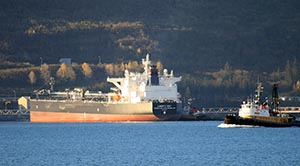
By AUSTIN LOVE
Council Project Manager
A new council study found that the low-sulfur fuel used in oil tankers has resulted in far less air pollution from crude oil tankers than just a few years ago.
The study, by Starcrest Consulting Group, evaluated the air pollution from tankers that traveled through Prince William Sound during 2014. The study looked at three air pollutants: nitrogen oxides, particulate matter, and sulfur oxides. These pollutants are produced by internal combustion engines and released in a vessel’s exhaust. Each of the pollutants can have negative impacts on human health, contributing to heart and lung disease. Researchers calculated the amount of each of these pollutants that would have been released if the tankers had been using fuel with a sulfur content of 2.7, 1.0, or 0.1 percent. The results were then compared to determine the amount reduced.
Study results
The study found that both particulate matter and sulfur oxides emissions are substantially reduced, and nitrogen oxides emissions are somewhat reduced. By using 0.1 percent sulfur fuel, tankers in the Sound reduced emissions by approximately 426 tons of sulfur oxides, 33 tons of particulate matter, and 29 tons of nitrogen oxides annually compared to using 2.7 percent sulfur fuel. Those changes represent a 96 percent reduction in sulfur oxides, an 80 percent reduction in particulate matter, and a 6 percent reduction in nitrogen oxides each year. A reduction of 33 tons of particulate matter is the equivalent to the emissions from about 5,000 heavy-duty diesel trucks operating for a year, while a reduction of 426 tons of sulfur oxides would be equal to the annual emissions from approximately 444,000 heavy-duty diesel trucks.
Regulations bring about change
These reductions are a result of regulations developed by the International Maritime Organization. To limit these substances, the regulations mandate that large ships either use technologies such as exhaust scrubbers or cleaner fuel to reduce emissions. The tankers in Prince William Sound are complying by burning fuel with a low sulfur content.
As of August 2012, large ships were required to use fuel with a sulfur content of 1.0 percent or less if they operated in North American waters. This area extends approximately 200 miles offshore of the United States and includes Prince William Sound. As of January 2015, regulations require vessels in the emissions control area to burn even cleaner fuel, with a sulfur content of 0.1 percent or less. Comparatively, tankers in international waters, more than 200 miles offshore, are allowed to burn fuel with a sulfur content of up to 3.5 percent. Low sulfur fuel is about 60 percent more costly than traditional fuels.
This study did not quantify the potential positive impacts of these reduced emissions on human and environmental health or measure impacts to local air quality. However, reductions in nitrogen oxides, particulate matter, and sulfur oxides emissions from tanker ships should improve local air quality by greatly reducing the mass of pollutants released in the region each year.
A full report on the tanker air emissions study is available here: Tanker Pollutant Loading to the Prince William Sound Airshed.